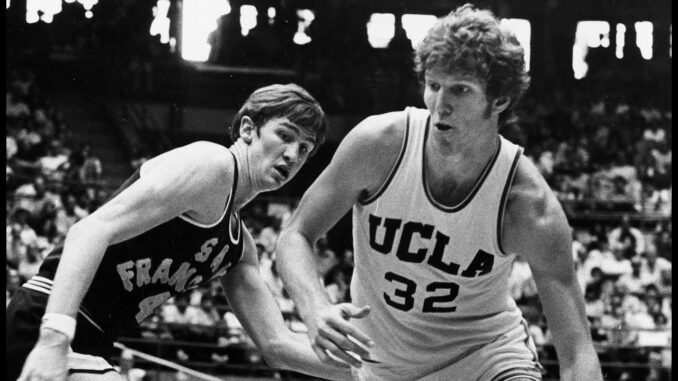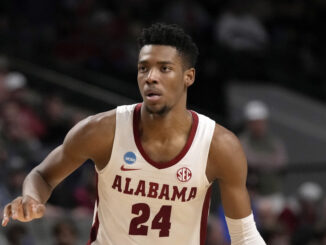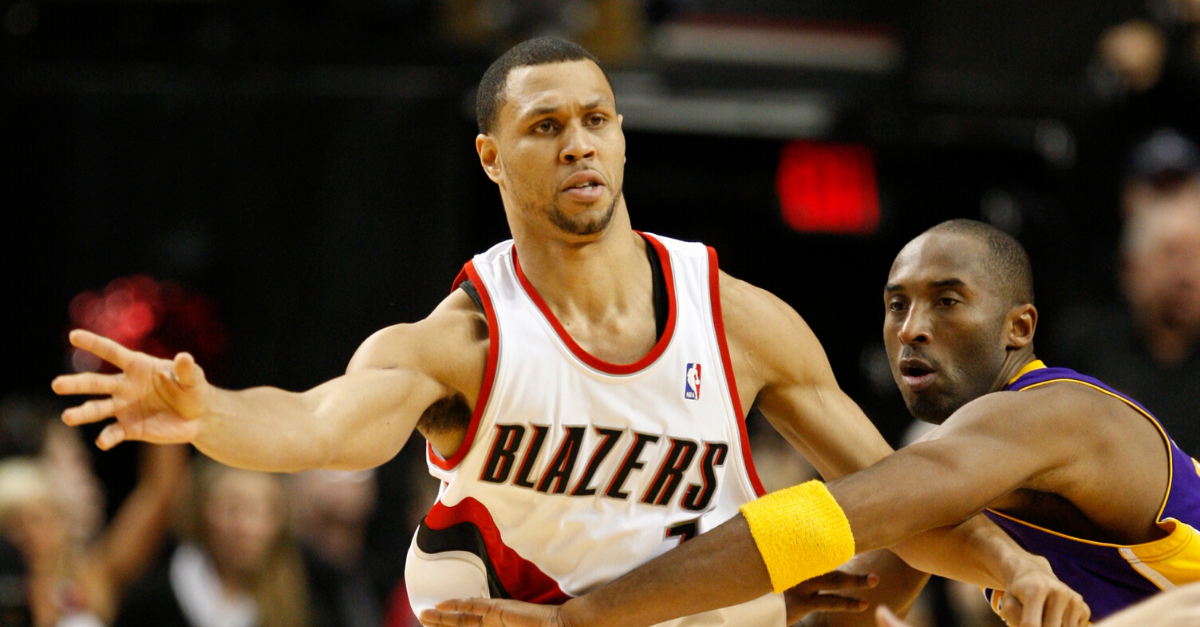
March was made for madness.
With the 2024 Men’s NCAA Tournament in full swing, we at Oregon Sports News are ready to go mad. We’re bringing together Casey Mabbott and Bryant Knox to snake draft five March Madness Legends a piece before defending each pick in writing. In the end, they’ll also defend the lineups they’ve built against one another.
The only catch? Every player has to have suited up for the Portland Trail Blazers at least one game in his professional career.
Who will go first overall? Will we see appearances from Blazers legends like Adam Morrison and Hasheem Thabeet?
Do you think you know who you’d take No. 1? Try choosing with the pressure on.
It’s time to go mad.
Let the draft begin!
*College stats are courtesy of Sports-Reference.com.
1. Maurice Lucas
The NC State Wolf Pack came out of literal obscurity in 1974, kicking UCLA and John Wooden out of the tournament for the first time in eight years and going into the final against Maurice Lucas and Marquette.
Lucas was a monster in the middle during his tournament run, averaging 15 points with 12 rebounds and 2 blocks per game. Playing against all-American and all-tournament center 7’2” Tom Burleson in the championship game, Lucas held his own with 21 points (his most in a tournament game) with 13 rebounds and one block, recording just four fouls over 40 minutes. His team may have lost the war, but no one can place that on Lucas’ shoulders.
Long before he came to Portland in the ABA-NBA expansion, he was proving he could dominate against the best big men in the business. There’s no one else I would want to build around. He’s not just the muscle; he’s the heart of the damn team.
—Mabbott
2. Bill Walton
When building a legendary March Madness roster, you have to think defense. More specifically, you need physicality in the trenches. And even more specifically, you need someone who makes the most of every single moment in an elimination game—every moment where efficiency reigns king.
In Bill Walton’s 1973 NCAA title appearance—arguably the most dominant championship showing of all time—the center scored 44 points on 21-of-22 shooting. Even that is short-counting it because his four dunks were overruled due to the NCAA’s “no dunking” stipulation.
Walton’s showing was near perfection disguised as domination, and it was his second title in as many years.
Easy choice with my first pick.
—Knox
3. Carmelo Anthony
Welcome to the roster, a true Portland Trail Blazers Legend.
Okay … no. Carmelo Anthony doesn’t belong anywhere near a Trail Blazers legends list. But he played a crucial role in the Covid-shortened bubble season, eventually giving Portland something genuine to cheer for. And after earning his way into the heart of Rip City, his tournament run with Syracuse is worth looking back on.
For starters, Frosh Melo led his Syracuse team (then named the Orangemen) to its first and only national title. A perfect title run was Carmelo’s personal showcase over six games, averaging 20.2 points, 9.8 rebounds, 2.5 assists, 1.8 steals, and a blistering 47.6 percent from deep.
In the end, Melo nearly recorded a 20-point triple-double en route to a three-point championship win over Kansas, which featured Nick Collison and Kirk Heinrich. That’s the type of firepower, leadership, and experience this team needs, and we’re making sure we have it in almost every corner.
—Knox
4. Clyde Drexler (CM)
NC State has just two titles in its history, and they went through multiple Blazers’ legends to get there – with Clyde being no exception. The Glide spent the 1982 offseason wondering just how freshman Michael Jordan and UNC had gotten the best of him in the Final Four (something that’s almost never discussed), and he helped Houston earn the number one overall ranking going into the 1983 tournament. Clyde and the Cougars rolled through their first few games and met NC State in the final. Some early and controversial calls kept Clyde in foul trouble in his only championship game in college, and even if you use just the Final Four game against Louisville as a measuring gauge, you would see what everyone saw then – Clyde was one of the most gifted and well-rounded players on the planet.
He didn’t just fly to the basket; he made you think you could fly when you watched him. He was the most talented dunker in Phi Slamma Jamma, and I’m not passing on all-time dunking talent.
—Mabbott
5. Greg Oden
Before his knees collapsed before our very eyes, Oden was an absolute monster on the NCAA level. Going into the championship game in 2007, he had already scored 72 points and grabbed 43 rebounds for a per-game average of 15 points and 9 rebounds—all while often being double—or triple-teamed and regularly in foul trouble.
In the championship game against Florida, Oden fought off three future NBA centers (Al Horford, Joakim Noah, and Chris Richard) while scoring 25 points, 12 rebounds, and 4 blocks. He also single-handedly kept Ohio State in the game while playing 38 minutes.
Like Lucas, he played his best against the best competition, and I can’t wait to see what he can do when surrounded by other players on the same level he is.
—Mabbott
6. CJ McCollum
CJ McCollum will be the least accomplished college star on either roster, but that’s relative, if not completely offensive.
McCollum became a March Madness legend in his own right with his historic 2012 takedown of the No. 2 Duke Blue Devils. Lehigh entered the Tournament as a 15 seed and as 12.5-point underdogs in Round 1. But the Mountain Hawks flipped the script, pulling off a 75-70 win in Greensboro, North Carolina, led by CJ’s 30 points, six rebounds, and six assists off the bench.
In McCollum’s words, “Try going to sleep after that.”
In CJ’s written account of the game via The Players’ Tribune, he also recalls what happened next. “We couldn’t help but stay up all night as a team talking about the game, which I think really hurt us in the next game against Xavier. We ended up blowing an 18-point lead, and I screwed up my mom’s bracket. It still kills me.”
If you haven’t checked out the whole article, click the link above when you’re all set here. It’s worth your time, and CJ is definitely worth picking for this draft.
—Knox
7. LaMarcus Aldridge
Having spent my last pick going against my defense-first strategy, we now bring in the 2006 Big 12 Defensive Player of the Year, LaMarcus Aldridge.
During his two seasons at Texas, Aldridge led the Longhorns to two NCAA Tournament appearances. It was in 2006, though, when they got their first taste at real success, including an appearance in the Final Four.
In all four games, LMA posted 15 points per game alongside ten rebounds, one steal, and two blocks. The Sweet 16 showing against West Virginia was the peak of his performances, going for 26 points and 13 rebounds in a 74-71 victory.
—Knox
8. Rasheed Wallace (CM)
A guy pushing seven feet that can play three positions well? It sounds like Cliff Robinson was reincarnated, and I loved Uncle Cliffy. Sheed helped UNC get to the Final Four in 1995, and even though he didn’t make it to the big dance, he played well in each round. His 22-point, 12-rebound, 6-block effort against Georgetown in the Sweet 16 was incredible, and it showcased how dominant he can be when he plays to his potential. He followed that up with a couple more great efforts in the elite eight and final four, but his 10 points, 10 rebounds, and four blocked shots in the semifinal were great even though his team lost.
Sheed put up good numbers while playing in a system that asked him to share the ball and not attempt a single three-point shot. I can’t wait to see what this guy can do when he has the freedom to play small forward as the second or third option and line up where he feels comfortable. Sure, he might disappear some nights, but the nights he shows up, he’s going to light up the scoreboard like the stat-stuffing star he is.
—Mabbott
9. Shabazz Napier (CM)
127 points, 27 assists, 15 steals, and 33 rebounds in six games, winning the national championship and being awarded tournament MVP. Need I say more?
Napier was larger than life, leading his team all over the stat sheet and being clutch when it counted.
In the 2014 tournament, there simply wasn’t a better player. He shot, passed, defended, and rebounded like a guy much taller than his six-foot frame. The title game featured a showdown between Napier and the over-hyped Kentucky team, who could not shut down Napier and his team despite a bigger, taller, and arguably more talented roster. If you’re going to draft a point guard, you want a guy that can win it all while doing it all. If he can do all of those things on an average team, who knows what he will be capable of when he’s teaming up with the other Monstars of college basketball.
—Mabbott
10. Juan Dixon (BK)
Juan Dixon, the Maryland-born Terrapin, led his program to its first-ever Final Four appearance in 2001. But he wasn’t satisfied.
In 2002, Dixon averaged almost 26 points per game and scored 18 points in the team’s first-ever NCAA championship. Also on that roster was eventual Trail Blazer Steve Blake, but Dixon was the recognized leader of the roster.
He also became the subject of an oral history commemorating the title 20 years later—a story you should read for a better understanding of just what Dixon meant to that program.
—Knox
Casey Mabbot’s Team
1. Shabazz Napier, UConn
2. Clyde Drexler, Houston
3. Rasheed Wallace, North Carolina
4. Maurice Lucas, Marquette
5. Greg Oden, Ohio State
I honestly don’t know what it would take to beat this team – a horrible infection of polio, maybe? The talent is off the charts, the will to win is off the charts, they are tall, they are strong, and they can beat you in a variety of ways – and none of them are known to be quitters when it counts.
Lucas is the heart of the team, and you really don’t know who the most important guy is. You have experience, you have youth, you have athletic ability that has never been seen in one starting five.
They can stretch the floor, push you around under the hoop, play a half-court game that would make a headache want aspirin, and shoot so well it would make a nightmare want to scream.
When I look at this team, I see an improved version of the 1990 UNLV Runnin Rebels, and their 30-point win in the title game over Duke (1990 DUKE!) is still a record today. Good bleeping luck!
Bryant Knox’s Team
1. Juan Dixon, Maryland
2. CJ McCollum, Lehigh
3. Carmelo Anthony, Syracuse
4. LaMarcus Aldridge, Texas
5. Bill Walton, UCLA
If you’re looking at just my team, there’s a lot to be excited about. Bill Walton and LaMarcus holding down the fort? Yes, please. That’s a defense that won’t be pushed around, not to mention a dynamic, versatile offensive version of the classic Twin Towers.
Defense after that starts to get a bit suspect, but there’s enough firepower across all five spots to feel confident we can play both sides of the floor with the best of them. And we’re going to attack opposing defenses from literally beyond the arc, through the mid-range, and straight above the rim.
There’s just one catch. We’re facing off against THE JUGGERNAUTS: Aka, Casey Mabbott’s team.
Comparing the two squads, I can’t even lie…I’m scared. Nobody on my team is stopping Clyde from getting to Walton and/or Aldridge at the rim. Size is a huge concern at that very guard position, with the 6’3” CJ attempting to both stop and score on a 6’7” wing known as The Glide.
I like my roster, and I think we can challenge anyone, especially with the right outside-in offensive scheme. But in this showdown against Casey? I’m going to need some serious madness.
Who Ya Got?
That’s it, folks. The picks are in, and the evidence is in front of you.
Time to hit the Oregon Sports News comments with your take. Are you Team Mabbott or Team Knox? Who would you draft first onto your squad?
Check out the full draft order below, and let us know what your five-man lineup looks like.
Full Draft Order
1. Maurice Lucas (CM)
2. Bill Walton (BK)
3. Carmelo Anthony (BK)
4. Clyde Drexler (CM)
5. Greg Oden (CM)
6. CJ McCollum (BK)
7. LaMarcus Aldridge (BK)
8. Rasheed Wallace (CM)
9. Shabazz Napier (CM)
10. Juan Dixon (BK)



